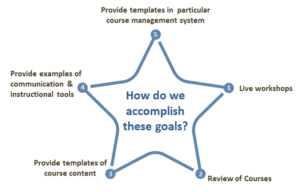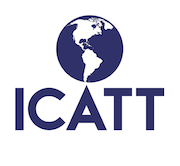Methodology for Converting Traditional to Online Courses
 As experts in distance education and online learning, our team provides the necessary tools for our clients to offer online programs that engage participants while maintaining mission focus. Our subject matter experts have decades of experience as distance educators, working closely with client organizations to assess how to best transition courses from traditional classroom environments into the virtual classroom, using a wide variety of eLearning platforms. Together, we create a plan of action that includes eight critical elements:
As experts in distance education and online learning, our team provides the necessary tools for our clients to offer online programs that engage participants while maintaining mission focus. Our subject matter experts have decades of experience as distance educators, working closely with client organizations to assess how to best transition courses from traditional classroom environments into the virtual classroom, using a wide variety of eLearning platforms. Together, we create a plan of action that includes eight critical elements:
1. Assessing organizational readiness: Implementing online programs can be a stressful period of transition for an organization. Whether academic institutions, corporations, or government agencies, there may be hesitation or challenges embracing new technologies and new instructional methods. Change can be a difficult journey, especially if everyone is not on the same page. We assess readiness by sending short electronic surveys at the start of the data gathering process that provides us with a picture of an organization’s technological literacy and overall readiness to implement an online program.
2. Assisting in developing a positive mindset: In our initial fact-finding mission, we want to immediately assist an organization to begin developing a positive mindset towards the new online program. As experienced distance education consultants, we have witnessed highly successful rollouts of online learning and can share stories of the excitement our clients generated by converting existing courses into engaging, learner-centric online curriculum.
3. Assessing existing institutional assets, resources and policies: As we gather data to help create the most efficient plan for online program implementation, we assess any existing resources which are available to your organization at the institutional level, while ensuring complete adherence to institutional and stated policies.
4. Assessing feasibility of course conversions: Some courses will be easier to transition into an online format than others. For example, one course may require weekly, live sessions with all learners actively participating via their microphones and video cameras, while other courses may be taught exclusively asynchronously, without the participant ever entering a “virtual” classroom. It all depends on the flexibility that can be allowed to the learner, and the actual content of the course.
5. Working with clients on course conversions or new course development: Our subject matter experts and instructional designers work closely with clients and training coordinators, providing expert assistance in converting courses within the particular course management system used by the organization.
6. Familiarizing clients with learner engagement via distance, available formal and informal communication tools, and instructional media and methods: Engaging with participants in an online program and maintaining their attention is far different from having a ICATT Professional Services. | ICATT Career Academy 11 face-to-face relationship in a classroom setting. Our team helps clients ease into the transition through a mix of instructional technology know-how and tried and true experiences engaging learners.
7. Managing time and energy in balancing classroom and online instruction: We know our clients have many responsibilities. Adding an online class roster can certainly be cause for stress. Our subject matter experts help clients manage their workload in a way that brings balance to their day to day activities.
8. Providing staff with expertise: We support our clients in making these key transitions by assigning a team comprised of four critical roles:
- Project Manager – Responsible for overseeing the entire project, delegating tasks and responsibilities, ensuring utmost quality of all work delivered to the client, working with client to ensure a smooth transition, and ensuring client satisfaction.
- eLearning /Online Program Subject Matter Expert – Responsible for conducting live workshops, on-demand remote support, reviewing courses, assessing feasibility of course conversion, conducting webinars, and delivering presentations to the client.
- Instructional Designer – Responsible for creating all examples and templates, as well as incorporating media into presentations, and creating templates of courses within the course management system used by the client (Canvas or Blackboard, for example).
- Tech Support – Acquires a working knowledge of the client’s existing course management system and serves as technical support for clients throughout the transition. This person acts as a back-up in case the client’s tech support resources have been exhausted.
How do we accomplish these goals?
The conceptual model below reflects our ‘Star’ approach to accomplishing our goals.


